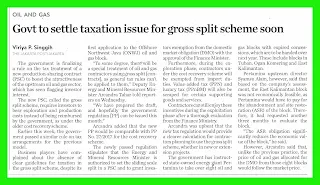The government is finalizing a rule on the tax treatment of a new production-sharing contract (PSC) to boost the attractiveness ofthe upstream oil and gas sector, which has seen Hagging investor interest.
The new PSC, called the gross split scheme, requires investors to bear exploration and production costs instead of being reimbursed by the government, as under the older cost recovery scheme, Earlier this week, the government passed a similar rule on tax arrangements for the previous model.
Business players have complained about the absence of clear guidelines for taxation in the gross split scheme, despite its first application to the Offshore Northwest Java (ONWJ) oil and gas block.
“To some degree, there'will be a special treatment of oil and gas contractors using gross split [contracts], as general tax rules can’t be applied to them,” Deputy Energy and Mineral Resources Minister Arcandra Tahar told reporters on Wednesday.
“We have prepared the draft, and hopefully the Government Regulation [PP/GR] can be issued this month.”
EAST KALIMANTAN BLOCK
Arcandra added that the new PP would be comparable with PP No. 27/2017 for the cost recovery scheme. The newly passed regulation stipulates that the Energy and Mineral Resources Minister is authorized to set the sliding scale split in a PSC and to grant investors exemption from the domestic market obligation (DMO) with the approval of the Finance Minister.
Furthermore, during the exploration phase, contractors under the cost recovery scheme will be exempted from import duties. Value-added tax (PPN) and luxury tax (PPnBM) will also be scraped for certain supporting goods and services. Contractors can still enjoy these incentives during the exploitation phase after a thorough evaluation from the Finance Ministry.
Arcandra was upbeat that the new tax regulation would provide a clearer calculation for contractors planning to use the gross split scheme, whether in new or extension projects. The government has instructed state-owned energy giant Pertamina to take over eight oil and gas blocks with expired concessions, which are to be handed over next year. These include blocks in Tuban, Ogan Komering and East Kalimantan.
Pertamina upstream director Syamsu Alam, however, said that based on the company’s assessment, the East Kalimantan block was not economically feasible, as Pertamina would have to pay for the abandonment and site restoration (ASR) of the block. Therefore, it had requested another three months to evaluate the block.
“The ASR obligation significantly reduces the economic value ofthe block,” he said. However, Arcandra said that, unlike the previous practice, the price of oil and gas allocated for the DMO from those eight blocks would follow the market price.
Jakarta Post, Page-14, Thursday, July 6, 2017



No comments:
Post a Comment